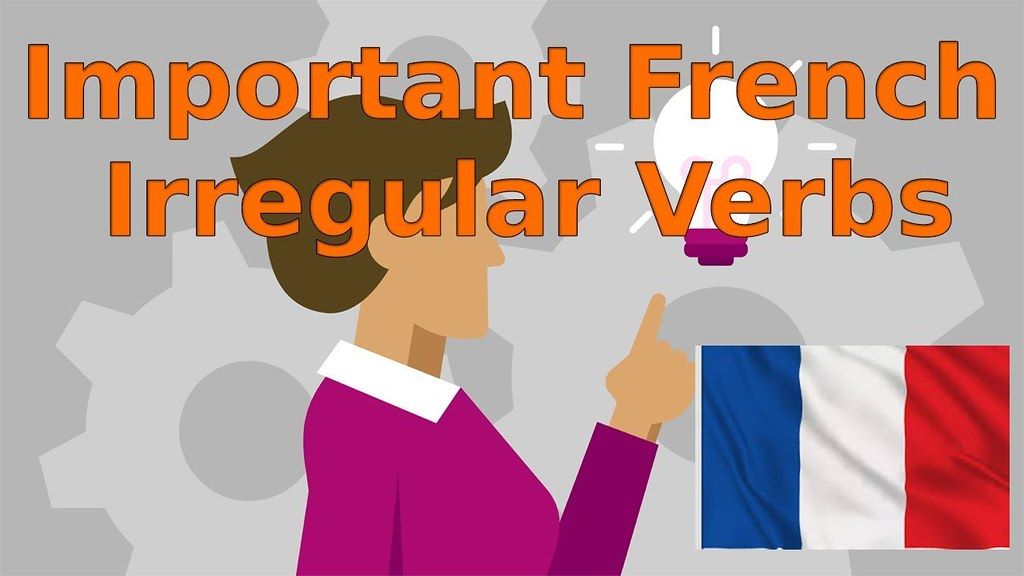
Irregular verbs in french
What is a regular verb and an irregular verb?
Regular verbs in French retain the same stem throughout their conjugation.
Conversely, irregular verbs change their stem depending on the tense and the person.

Irregular French Verbs. How to do?
What are the most frequent irregular verbs in the present indicative?
Être (to be) : je suis, tu es, il/elle/on est, nous sommes, vous êtes, ils/elles sont.
Avoir (to have) : j’ai, tu as, il/elle/on a, nous avons, vous avez, ils/elles ont.
Faire (to do) : je fais, tu fais, il/elle/on fait, nous faisons, vous faites, ils/elles font.
Aller (to go) : je vais, tu vas, il/elle/on va, nous allons, vous allez, ils/elles vont.
Savoir (to know) :je sais, tu sais, il sait, nous savons, vous savez, ils savent
Verbs ending in -aître like connaître, disparaître
They keep the circumflex accent when the « i » is placed in front of a « t« .This is the case in the third person singular present indicative.
- Je connais, tu connais, il connaît,
But in the plural they lose the t and have the double ss (nous connaissons).
- Nous connaissons, vous connaissez, ils connaissent
The verb Dire (to say):
- Je dis, tu dis, il dit, nous disons, vous dites, ils disent
The verb dire, in the second person plural of the present indicative, is transformed into “dites” and not “disez”; it does not follow the general rule.
The verb Faire (to do) :
- Je fais, tu fais, il fait, nous faisons, vous faites, ils font.
Here the 2nd person plural of the present indicative is “vous faites”. The other particularity is for the 3rd person plural which gives “ils font”.
Verbs ending in -dre like prendre (to take), comprendre (to understand):
There are many of them and it is important to pay attention to their conjugation and endings.
For verbs like prendre, comprendre, apprendre – to take, to understand, to learn, they keep the “d” in the singular
- je prends, tu prends, il prend, nous prenons, vous prenez, ils prennent
- Je comprends, tu comprends, il comprend, nous comprenons, vous comprenez, ils comprennent.
We also observe that they double their “n” in the 3rd person plural.
Atteindre (to reach)
This verb also ends in -dre but is conjugated differently:
- j’atteins, tu atteins, il/elle/on atteint, nous atteignons, vous atteignez, ils/elles atteignent
There is no longer a “d” in the 1st, 2nd, person, a “t” in the 3rd, and the “ND” of the verb attain is transformed into “GN” in the plural persons.
You see that for the same verb ending in -DRE (comprendre //atteindre – understand //reach), the conjugation is different for the 2 verbs.
Vouloir, pouvoir (to want – to be able to) :
The particularity is to take an “x” instead of an “s” like most other irregular verbs. And the “EU” transforms into “OU” in plural persons.
- Je veux, tu veux, il veut, nous voulons, vous voulez, ils veulent
- Je peux, tu peux, il peut, nous pouvons, vous pouvez, ils peuvent
Verbs in – ger like Manger ou plonger ( to eat or to dive)
You put an “- e” between the “- g” and the “- ons”.
- Plonger : je plonge, tu plonges, il/elle/on plonge, nous plongeons, vous plongez, ils/elles plongent
Verbs in – cer, like commencer (to begin)
You put a cedilla on the “c” in the 2nd person plural and generally before “ons”.
- je commence, tu commences, il/elle/on commence, nous commençons, vous commencez, ils/elles commencent
- Lancer (to throw): je lance, tu lances, il/elle/on lance, nous lançons, vous lancez, ils/elles lancent
Other frequent verbs:
Verbs with an accent like céder, préférer (to yield – to prefer)….
The “é” transforms into “è” except for the 2nd person plural.
- Je cède, tu cèdes, il cède, nous cédons, vous cédez, ils cèdent.
- Je préfère, tu préfères, il préfère, nous préférons, vous préférez, ils préfèrent
The verbs mener et lever (to lead and to raise)
The “e” becomes “è” except for 1st and 2nd person plural.
- Je mène,, tu mènes, il mène, nous menons, vous menez, ils mènent
- Je lève, tu lèves, il lève, nous levons, vous levez, ils lèvent.
Verbs ending in -AYER like payer (to pay)
Keep the “y” or the “y” turns into “i” in front of the silent “e”.
- Je paie, tu paies, il paie, nous payons, vous payez, ils paient
- OR je paye, tu payes, il paye, nous payons, vous payez, ils payent

Irregular verbs in French
And a few more examples:
- Croire (to believe): je crois, tu crois, il/elle/on croit, nous croyons, vous croyez, ils/elles croient.
- Devoir (to have to/need/must): je dois, tu dois, il doit, nous devons, vous devez, ils/elles doivent.
- Ecrire ( to write): j’écris, tu écris, il/elle/on écrit, nous écrivons, vous écrivez, ils/elles écrivent.
- Lire (to read): je lis, tu lis, il/elle/on lit, nous lisons, vous lisez, ils/elles lisent.
- Recevoir (to receive): je reçois, tu reçois, il reçoit, nous recevons, vous recevez, ils/elles reçoivent.Tenir- venir (to hold/come): je tiens/viens, tu tiens/viens, il/elle/on tient/vient, nous tenons/venons, vous tenez/venez, ils/elles tiennent/viennent.
- Valoir (Be worth): je vaux, tu vaux, il/elle/on vaut, nous valons, vous valez, ils/elles valent.
Conclusion
There you have it! You have something to practice…it is conjugation! And as you know, it’s practice that improves learning. You will find another useful article about French tense here.
If you have any questions, leave them in the comments!
And if you want to take your 1is free class with me, it’s here!
A bientôt
Julie
